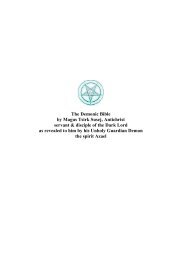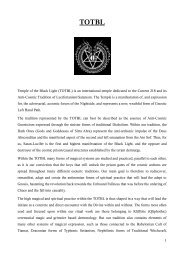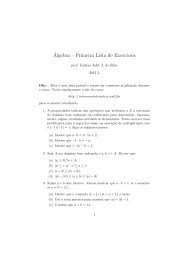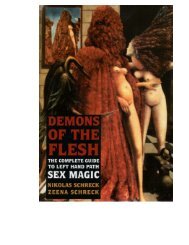Satanism Today - An Encyclopedia of Religion, Folklore and Popular ...
Satanism Today - An Encyclopedia of Religion, Folklore and Popular ...
Satanism Today - An Encyclopedia of Religion, Folklore and Popular ...
Create successful ePaper yourself
Turn your PDF publications into a flip-book with our unique Google optimized e-Paper software.
Mesoamerica 173<br />
Richardson, James, Joel Best, <strong>and</strong> David G. Bromley.<br />
The <strong>Satanism</strong> Scare. New York: Aldine de<br />
Gruyter, 1991.<br />
Victor, Jeffrey. Satanic Panic: The Creation <strong>of</strong> a<br />
Contemporary Legend. Chicago: Open Court,<br />
1993.<br />
Wakefield, Hollida, <strong>and</strong> Ralph Underwager. Return<br />
<strong>of</strong> the Furies. Chicago: Open Court, 1994.<br />
Mephistopheles<br />
The legend <strong>of</strong> Faustus, who signed a pact with the<br />
devil by selling his soul to Mephistopheles, became<br />
popular with Goethe’s Faust. The basic narrative<br />
is, however, much older, originating as a mythical<br />
story during the medieval period.<br />
Dr. Faust’s story drew upon the life <strong>of</strong> a<br />
philosopher who decided to make a living by<br />
casting horoscopes <strong>and</strong> predicting the future. In<br />
subsequent decades, Faust’s life was transformed<br />
into the legend <strong>of</strong> a philosopher who decided to<br />
ab<strong>and</strong>on philosophy <strong>and</strong> devote himself to magic<br />
practices <strong>and</strong> spells. Once, while practicing magic<br />
invocations, Mephistopheles appears to the doctor<br />
with a proposal: Mephistopheles will teach the<br />
doctor the Devil’s knowledge <strong>and</strong> powers in<br />
exchange for Faust’s soul after twenty-five years.<br />
Mephistopheles’s name etymologically means “he<br />
who loves not the light,” in contrast with Lucifer<br />
(“light bearer”). The name originated in the<br />
Renaissance period as a combination <strong>of</strong> Greek,<br />
Latin, <strong>and</strong> possibly Hebrew elements, which<br />
explain the existence <strong>of</strong> variants <strong>of</strong> the name, such<br />
as Mephisto, Mephistophilus (in Shakespeare’s<br />
Merry Wives <strong>of</strong> Windsor), Mephist, <strong>and</strong> Mephisto.<br />
The Faustus legend has animated popular<br />
culture since the Middle Ages. With the creation <strong>of</strong><br />
Doctor Faustus by Christopher Marlowe<br />
(1564–1593), however, it became a topic <strong>of</strong> artistic<br />
inspiration in poetry <strong>and</strong> music throughout the<br />
following centuries, culminating with Faust: Eine<br />
Tragödie by Johann Wolfgang von Goethe<br />
(1749–1832). Although Goethe’s work is regarded<br />
as the apex <strong>of</strong> the development <strong>of</strong> this story, the<br />
legend continued to inspire nineteenth-century<br />
literature on the Devil.<br />
Following twenty-five years <strong>of</strong> devilish practice,<br />
Goethe’s Faust repents having sold his soul to<br />
the Devil <strong>and</strong> is saved. In Marlowe’s work, by<br />
contrast, Faustus is lost. The Devil, however, was<br />
no longer the enemy <strong>of</strong> the medieval dueling<br />
contest with Christ or with a saint or a virgin. The<br />
contest <strong>of</strong> the Devil in the eighteenth century was<br />
within people who left their individual struggles<br />
<strong>and</strong> sinned for the sake <strong>of</strong> gaining personal power.<br />
Last but not least, the “new” Devil was to a certain<br />
extent sympathetic to the human condition, <strong>and</strong><br />
introspective. The Devil’s introspection <strong>and</strong><br />
humanization began in the sixteenth <strong>and</strong> seventeenth<br />
centuries, <strong>and</strong> was reflected even in some <strong>of</strong><br />
the human characters <strong>of</strong> Shakespeare’s tragedies.<br />
Goethe’s Devil no longer embodies an exclusively<br />
a Christian meaning. He is, rather, a more<br />
complex, multifaceted, <strong>and</strong> ambiguous character,<br />
representing not only evil against good, but also<br />
the oppositions <strong>of</strong> matter-spirit <strong>and</strong> chaos-order,<br />
as well as the stimulus to creativity. Although in<br />
the late nineteenth century new operas depicted<br />
Mephistopheles’s <strong>and</strong> Dr. Faust’s story, Goethe’s<br />
Mephistopheles remained the masterpiece <strong>of</strong> the<br />
Mephistopheleses represented in literature.<br />
See also Faust; Pact with the Devil<br />
For Further Reading:<br />
Davidson, Gustav. A Dictionary <strong>of</strong> <strong>An</strong>gels Including<br />
the Fallen <strong>An</strong>gels. New York: Free Press, 1967.<br />
Rudwin, Maximilian. The Devil in Legend <strong>and</strong><br />
Literature. Chicago: Open Court, 1931.<br />
Mesoamerica<br />
The aboriginal societies <strong>of</strong> the Americas represent<br />
a wide variety <strong>of</strong> different cultures, a variety that is<br />
missed under the generic rubric “Indian” through<br />
which Native Americans are usually regarded. Far<br />
from being a single monolithic culture, aboriginal<br />
Americans had created a series <strong>of</strong> significant civilizations—cultures<br />
that <strong>of</strong>ten bore little resemblance<br />
to one another. Despite this diversity, it is<br />
possible to assert that, like most societies outside<br />
the influence <strong>of</strong> the Zoroastrian-Judeo-Christian-<br />
Islamic complex, all <strong>of</strong> these traditions postulated<br />
the existence <strong>of</strong> demonic forces, but none<br />
possessed a full-blown Satan figure.<br />
Prior to the intrusion <strong>of</strong> Europeans, the Native<br />
peoples <strong>of</strong> central <strong>and</strong> south America had created<br />
societies rivaling the civilizations <strong>of</strong> ancient Egypt,<br />
Mesopotamia, India, <strong>and</strong> China. These are the so-
















